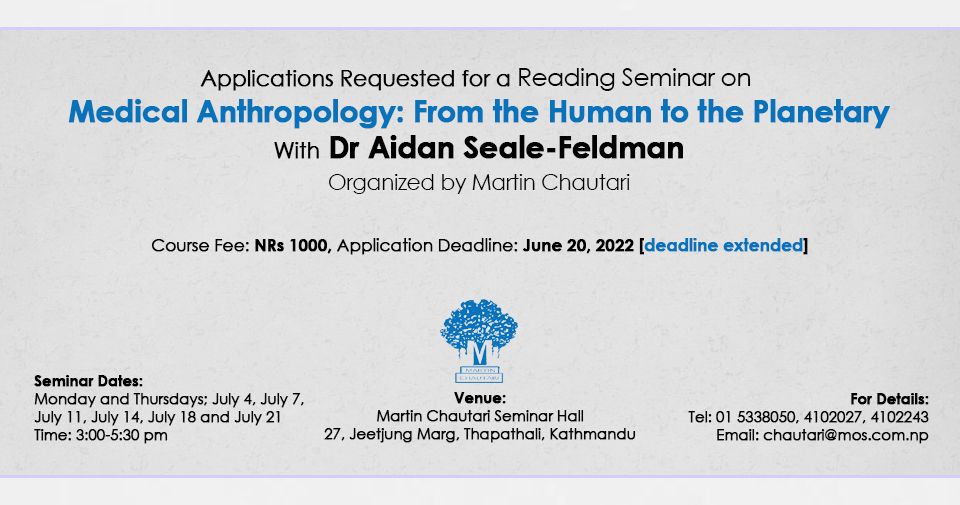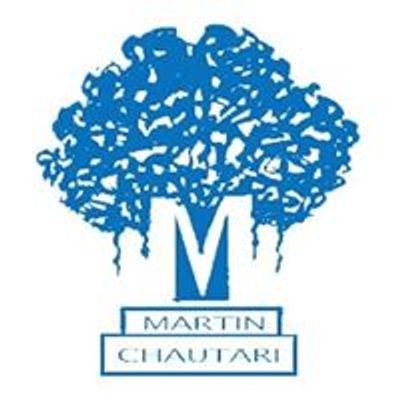Applications Requested for a Reading Seminar on Medical Anthropology:From the Human to the Planetary
Schedule
Mon Jul 04 2022 at 03:00 pm to Mon Jul 18 2022 at 03:00 pm
Location
Martin Chautari | Kathmandu, BA
 Applications Requested for a Reading Seminar on Medical Anthropology: From the Human to the Planetary [deadline extended until June 20, 2022]
Applications Requested for a Reading Seminar on Medical Anthropology: From the Human to the Planetary [deadline extended until June 20, 2022]With Dr Aidan Seale-Feldman
Organized by Martin Chautari
Course Description:
What would it mean to think of health not only as a human concern, but at the planetary scale? In 2014, The Lancet published a manifesto declaring the birth of a new field of medicine. They called this field “planetary health.” Unlike the paradigm of public health that came before, the concept of planetary health is grounded in the understanding that human health is deeply intertwined with the flourishing of the natural systems on which it depends. This course uses the concept of “planetary health” as a lens into the relationship between health and the environment from a broad anthropological perspective. In doing so, we will bring together classic and contemporary work in medical anthropology that explores possibilities for life on a damaged planet. Topics include illness, embodiment, climate change, epidemics, human-animal relations, toxicity, and local biologies, as well as knowledge from “the archives of the world” (Mbembe 2019) that might inspire other ways of relating to non- and more-than-human worlds. Over the course of this six-session seminar, we will consider how the confluence of contemporary crises of climate change, a global pandemic, and ongoing histories of oppression demand new ways of conceptualizing illness and health.
***
Aidan Seale-Feldman is an Assistant Professor of Medical Anthropology at the University of Notre Dame where she teaches undergraduate and graduate courses on health and culture, biopolitics, psychic life, and planetary health. Grounded in ethnographic explorations of disaster, mental health, and mass hysteria in Nepal, her research asks how to approach forms of affliction that are not bound within the individual but instead move across bodies, environments, and generations. Her work has been published in Cultural Anthropology, Ethos, and HIMALAYA: The Journal of the Association for Nepal and Himalayan Studies, South Asia: Journal of South Asian Studies, as well as in public venues such as Somatosphere, The Record Nepal, and Cultural Anthropology online. Dr. Seale-Feldman received her M.A. and Ph.D. in Anthropology from the University of California, Los Angeles and was a Postdoctoral Research Associate in Bioethics at the University of Virginia.
Seminar Dates: Monday and Thursdays; July 4, July 7, July 11, July 14, July 18 and July 21
Time: 3:00-5:30 pm
Venue: Martin Chautari Seminar Hall, Thapathali, Kathmandu (Tel: 5338050/4102027/4102243)
Course fee: NRs. 1,000
Eligibility Requirement: (i) You must be studying at the MA level or have at least an MA degree in the social sciences; (ii) You should be willing to do all the assigned readings and come to the seminar prepared to discuss them (see below for details); (iii) You should be able to read English proficiently.
Application Process: Please submit an 800-word essay explaining (a) your previous educational background; (b) your research experiences and interests; and (c) how taking this course fits into your current and future academic plans. Please also include a one-page CV of yours with full contact details including your current email address and telephone numbers. Please submit the above in person at MC’s office (27 Jeet Jung Marg, Thapathali, Kathmandu’ phone: 5338050/4102027/4102243) in a closed envelope that states ‘Application for Medical Anthropology Seminar’ on the front side. Or applications can be sent online. Please attach the requested essay and CV as one single file to a simple email sent to [email protected] with “Application for Medical Anthropology Seminar” on the subject line. The application deadline is June 20, 2022. Successful applicants will be notified by June 22, 2022. They will have to enroll by June 26, 2022 by paying the course fee to Martin Chautari. Readings will be provided after enrollment.
Reading Schedule:
“It must be clear to all that the European archive alone can no longer account for the complexities, both of history, of the present, and of the future of our human and other-than-human world. What we all inherit are the archives of the world at large. Not just one kind of archive. For me, this is a matter of common sense. I am in favour of expanding the archive, reading the different archives of the world critically, each with and against the others. There can’t be any other meaning to a planetary curriculum.”
–Achille Mbembe, “Thoughts on the Planetary”
CLASS 1: Symptoms
Kleinman, Arthur. 1988. The Illness Narratives: Suffering, Healing & the Human Condition. New York: Basic Books. (Ch. 1: The Meaning of Symptoms and Disorders + Ch. 2: The Personal and Social Meanings of Illness).
Lock, Margaret, and Patricia Kaufert. 2001. Menopause, Local Biologies, and Cultures of Aging. American Journal of Human Biology 13(4): 494–504.
CLASS 2: Knowledge
Pigg, Stacy. 2001. Languages of Sex and AIDS in Nepal: Notes on the Social Production of Commensurability. Cultural Anthropology 16(4): 481–541.
Seale-Feldman, Aidan. 2022. The Possibility of Translation: Turning Ghosts into Psychosomatic Disorders in Nepal. South Asia: Journal of South Asian Studies 45(1): 130–145.
Santos, Boaventura de Sousa. 2016. Epistemologies of the South: Justice Against Epistemicide. London & New York: Routledge. (Introduction)
CLASS 3: Embodiment
Farmer, Paul. 2005. Pathologies of Power: Health, Human Rights, and the New War on the Poor. Berkeley: University of California Press. (Ch. 1: On Suffering and Structural Violence)
Gravlee, Clarence C. 2009. How Race Becomes Biology: Embodiment of Social Inequality. American Journal of Physical Anthropology 139(1): 47–57.
CLASS 4: Contagion
Farmer, Paul. 1999. Infections and Inequalities: The Modern Plagues. Berkeley: University of California Press. (Ch. 2: Rethinking “Emerging Infectious Disease”)
Nading, Alex. 2013. Humans, Animals, Health: From Ecology to Entanglement. Environment and Society: Advances in Research 4: 60–78.
Lakoff, Andrew. 2015. Vaccine Politics and the Management of Public Reason. Public Culture 27(3): 419–425.
Caduff, Carlo. 2020. “What Went Wrong: Corona and the World after the Full Stop.” Medical Anthropology Quarterly 34(4): 467–487.
CLASS 5: Toxicity
Roberts, Elizabeth. 2017. What Gets Inside: Violent Entanglements and Toxic Boundaries in Mexico City. Cultural Anthropology 32(4): 592–619.
Langwick, Stacey Ann. 2018. A Politics of Habitability: Plants, Healing, and Sovereignty in a Toxic World. Cultural Anthropology 33(3): 415–443. https://doi.org/10.14506/ca33.3.06.
Horton, Richard, Robert Beaglehole, Ruth Bonita, John Raeburn, Martin McKee, and Stig Wall. 2014. From Public to Planetary Health: A Manifesto. The Lancet 383(9920): 847.
CLASS 6: Growth
Livingston, Julie. 2019. Self-Devouring Growth: A Planetary Parable as Told from Southern Africa. Durham: Duke University Press. (pp. 1–129)
Where is it happening?
Martin Chautari, Thapathali, Kathmandu, Nepal